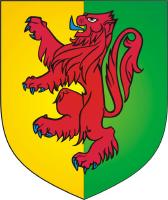

William Marshall, the most famous knight in English history, was born around 1144, during the Anarchy. His father, John Marshall, was originally loyal to King Stephen, but five years before William's birth, switched to Empress Matilda's side. In 1152, King Stephen besieged the Marshalls in Newbury Castle, and when John called for a truce, Stephen took William to ensure John obeyed the truce. John refused to surrender, and Stephen threatened to hang William. John called his bluff, saying that he could make more sons, and Stephen could not bring himself to harm William. A few years later, Stephen died of natural causes, and Matilda's son, Henry II Curtmantle, became king of England.
When William was about 16 years old, he became a knight-bachelor, a knight not belonging to any order of chivalry. His cousin, William de Tancarville, delivered the colée, the sword blow that made him a knight, and gave William his finest horse. William's first action as a knight was to defend the village of Drincourt in Normandy against the French. De Tancarville said that William was the only true knight who fought there, as he was the only one who fought to liberate the people, rather than capture valuable prisoners.
After leaving de Tancarville's service, William entered his first tournament, where he won despite having to have his helmet removed afterward as the damage to it made it dangerous for him to wear it. He joined the service of his uncle on his mother's side, Patrick, 1st Earl of Salisbury, in 1168. Soon after, Patrick and his knights escorted Eleanor of Aquitaine, Henry's Queen-consort, and were to have aided in putting down an uprising in Aquitaine afterward. The group was attacked by Guy of Lusignon, and the Queen escaped, but William was captured after being attacked from behind and badly wounded and Patrick was killed.
William was taken to an unknown dungeon but later released when Eleanor traded six hostages for him. He then became a servant of King Henry, and was put in charge of training Henry the Young King, who had been crowned as King under Henry II. William delivered the colée for Henry the Young King, but was soon forced out of the King's household when a rumor spread that William was involved in an affair with Henry the Young King's wife, Margaret of France.
William returned to the Young King's service the next year, and remained there until Henry the Young King's death in 1183. Henry the Young King asked him to place his cross in the Holy Sepulcher. William then stayed in the Holy Land until 1187, when Henry II asked him to join his service and gave him the fiefdom of Cartmel. Two years later, Henry was attacked by Richard the Lion Heart, but Richard was defeated when William unhorsed him. This is said to be the only time Richard was unhorsed.
Henry promised to give Isabel de Clare, the heir to the Earldom of Pembroke, but died before he could. Richard revealed that he was not angry over the incident and fulfilled his father's promise. As well, he charged William to take care of England while he was crusading, and William prevented Prince John from taking over when Richard was held prisoner in Dürnstein Castle by Leopold V the Virtous, 2nd Duke of Austria.
After Richard's death in 1199, William was placed in charge of the treasury under his last orders. After the nobles began to realize that Richard had bankrupted the kingdom and John, the new King of England, started overtaxing them, William was sent to King Philip II of France by the King. He attempted to negotiate giving England to Philip, but John quickly took him back and claimed he was a traitor. William challenged John to a duel, but none of John's knights would fight William and John retracted his claim.
During the Barons' Wars, William supported the King, as his oath bound him to do, although he felt that the nobles were on the right. He pushed for peace between the two sides, and in 1214, William was one of the three signers of the Magna Carta, along with King John and William's eldest son, also named William. John died two years later and made William regent over Henry III.
The next year, the French attempted to invade England, and Prince Louis and Thomas de Perche, 5th Count of Perche, led the French armies. The French and English forces, led by William, met at Lincoln, and William killed Perche, the only knight to die at the Second Battle of Lincoln. William sent Louis and his officers home rather than taking them hostage, an act others would see as betrayal, although William viewed it as a matter of honor.
In 1219, William fell ill and moved into the Tower of London. He organized his affairs, leaving his sons only their name and titles so that they could enter the world the way he did. William was entered into the Knights Templar, and on May 14, died. He was buried in the Temple Church in London, and was remembered throughout England and France as the flower of chivalry. After William's death, each of his sons would hold the title of Earl of Pembroke and die childless. It eventually passed to his granddaughter's husband and his heirs before leaving William's descendants.